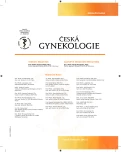Hyperlipidaemia in pregnancy
Authors:
Z. Kokrdová; M. Košťál
Authors‘ workplace:
Fakulta zdravotnických studií, Univerzita Pardubice, děkan prof. MUDr. A. Pellant, DrSc.
; Gynekologicko-porodnická klinika, Pardubická krajská nemocnice, a. s., přednosta doc. MUDr. M. Košťál, CSc.
Published in:
Ceska Gynekol 2013; 78(2): 150-156
Overview
Objective:
We investigated the degree of pregnancy - induced hyperlipidaemia in normal and complicated pregnancies. Under the „stress of pregnancy“ supraphysiologic increase in lipid and lipoprotein levels may delevop (similar to changes in carbohydrate metabolism).
Design:
Clinical study.
Setting:
Department of Obstetrics and Gynaecology, Regional Hospital Pardubice, Faculty of Health Studies, University of Pardubice.
Methods:
Fasting plasma lipid and lipoprotein levels were studied in 26 healthy pregnant women, in 30 women with high risk pregnancy and in 30 nonpregnant healthy controls. The results were compared to reference values given in percentiles to find those exceeding the 95th percentile of the reference values for the third trimester.
Results:
Two subjects (3.6%) with supraphysiologic increase in plasma lipids in late pregnancy were identified among the 56 women studied. The details are reviewed in the study as well as the rare forms of extreme hyperlipoproteinaemia during pregnancy in women with pre-existing disorder of lipid metabolism.
Conclusion:
The measurement of lipid and lipoprotein levels cannot be recommended in all pregnant women in late pregnancy. Hovewer, in subjects with family history of dyslipidaemia or premature atherosclerosis in the first - degree relatives and without hyperlipidaemia outside pregnancy, supraphysiologic increase in lipid and lipoprotein levels developed under the „stress of pregnancy“ might indentify women at risk of dysli-pidaemia in future life.
Keywords:
supraphysiologic hyperlipidaemia – lipid disorders – pregnancy
Sources
1. Anedda, S., Mura, S., Marcello, C., Pitus, P. Help LDL-apheresis in two cases of familial hypecholesterolemic pregnant women. Transfus Apher Sci, 2011, 44(1), p. 21–24.
2. Barker, DJP. Fetal programming of coronary heart disease. Trends Endocrinol Metab, 2002, 19(9), p. 364–368.
3. Basaran, A. Pregnancy-induced hyperlipoproteinemia: review of the literature. Reprod Sci, 2009, 16(5), p. 431–437.
4. Ben-Haroush, A., Yogev, Y., Hod, M. Epidemiology of gestational diabetes mellitus and its association with type 2 diabetes. Diabet Med, 2004, 21, p. 103–113.
5. Butte, NF. Carbohydrate and lipid metabolism in pregnancy: normal compared with gestational diabetes mellitus. Am J Clin Nutr, 2000, 71, p. 1256S–1261S.
6. Eapen, DJ., Valiani, K., Reddy, S., Sperling, L. Management of familial hypercholesterolemia during pregnancy: case series and discussion. J Clin Lipidol, 2012, 6(1), p. 88–91.
7. Ghio, A., Bertolotto, A., Resi, V., et al. Triglyceride metabolism in pregnancy. Adv Clin Chem, 2011, 55, p. 133–153.
8. Herrera, E., Ortega-Senovilla, H. Disturbances in lipid metabolism in diabetic pregnancy – Are these the cause of the problem? Best Pract Res Clin Endocrinol Metab, 2010, 24(4), p. 515–525.
9. Kengne, AP., Turnbull, F., MacMahon, S. The Framingham Study, diabetes mellitus and cardiovascular disease: turning back the clock. Prog Cardiovasc Dis, 2010, 53(1), p. 45–51.
10. Kusters, DM., Homsma, SJM., Huttenk, BA., et al. Dilemmas in treatment of women with familial hypercholesterolaemia during pregnancy. Neth J Med, 2010, 68(1), p. 299–303.
11. Montes, A., Walden, CE., Knopp, RH., et al. Physiologic and supraphysiologic increases in lipoprotein lipids and apoproteins in late pregnancy and postpartum. Possible markers for the diagnosis of “prelipemia”. Arteriosclerosis, 1984, 4, p. 407–417.
12. Parikh, NI., Cnattingius, S., Dickman, PW., et al. Parity and risk of later-life maternal cardiovascular disease. Am Heart J, 2010, 159(2), p. 215–221.
13. Piechota, W., Staszewski, A. Refecence ranges of lipids and apolipoproteins in pregnancy. Europ J Obstet Gynecol Reprod Biol, 1992, 45, p. 27–35.
14. Robinson, JG., Goldberg, AC. Treatment of adults with familial hypercholesterolemia and evidence for treatment: Recommendations from the national Lipid Association Expert panel on Familial hypercholesterolemia. J Clin Lipidol, 2011, 5, p. S18–S29.
15. Rybka, J. Trnitá cesta metabolického syndromu prosadit se v praxi. Vnitř Lék, 2010, 56(7), s. 727–735.
16. Sattar, N., Greer, IA. Pregnancy complications and maternal cardiovascular risk: opportunities for intervention and screening? BMJ, 2002, 325, p. 157–160.
17. Sohi, G., Revesz, A., Hardy, DB. Permanent implications of intrauterine growth restriction on cholesterol homeostasis. Semin Reprod Med, 2011, 29(3), p. 246–256.
18. Sunman, H., Canpolat, U., Sahiner, L., et al. Use of fenofibrate during the first trimester of unplanned pregnancy in a patient with hypertriglyceridemia. Ann Pharmacother, 2012, 46(2), p. e5.
19. Thorogood, M., Seed, M., De Mott, K., Guideline development group. Management of fertility in women with familial hypercholesterolaemia: summary of NICE guidance. BJOG, 2009, 116(4), p. 478–479.
20. Watts, GF., Morton, K., Jackson, P., et al. Management of patients with severe hypertriglyceridaemia during pregnancy: report of two cases with familial lipoprotein lipase deficiency. Br J Obstet Gynaecol, 1992, 99, p. 163–166.
Labels
Paediatric gynaecology Gynaecology and obstetrics Reproduction medicineArticle was published in
Czech Gynaecology

2013 Issue 2
-
All articles in this issue
- Selective progesterone receptor modulators and their therapeutical use
- L-arginin in prevention and treatment of pre-eclampsia
- Systemic enzyme therapy in the treatment of recurrent vulvovaginal candidiasis
- Evaluation of p16 protein in the managementof cervical dysplasia
- Reccurent pregnancy loss – review
- Guideline for prevention of RhD alloimmunizationin RhD negative women
- Pregnancy and multiple sclerosis –outcomes analysis 2003–2011
- Hyperlipidaemia in pregnancy
-
Psychosocial climate in maternity hospitals from the perspective of parturients I.
Results from a national survey on perinatal care satisfactionusing a representative sample of 1195 Czech parturients -
Cancer stem cells and ovarian cancer
Characteristics, importance and potential applicationsin clinical practice - Retroperitoneal lymphangioleiomyomatosis – a case reports
- Transfusion-related acute lung injury (TRALI) – review
- Blockade of calcium channels – a perspectiveof male contraception?
- Atlas of gametes and embryos of several animals and human
- Czech Gynaecology
- Journal archive
- Current issue
- About the journal
Most read in this issue
- Transfusion-related acute lung injury (TRALI) – review
- Reccurent pregnancy loss – review
- Evaluation of p16 protein in the managementof cervical dysplasia
- Hyperlipidaemia in pregnancy
